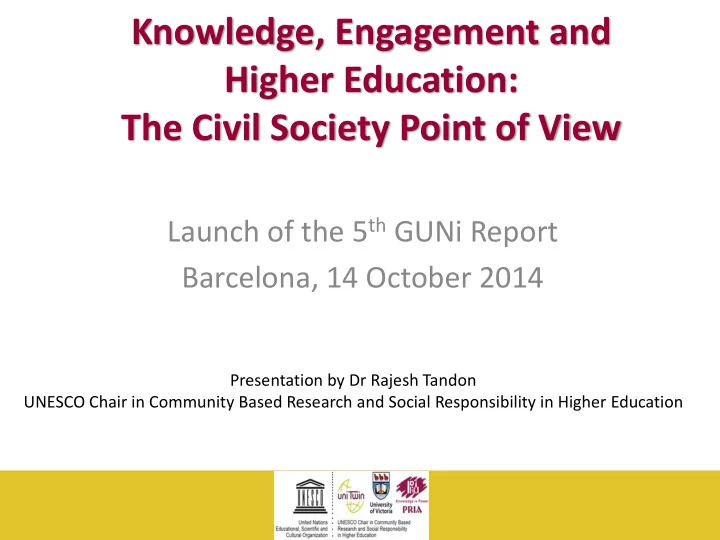

Knowledge, Engagement and Higher Education: The Civil Society Point of View Launch of the 5 th GUNi Report Barcelona, 14 October 2014 Presentation by Dr Rajesh Tandon UNESCO Chair in Community Based Research and Social Responsibility in Higher Education
“ Education for Life, education through life, & education throughout life Mahatma Gandhi
Be Knowledgiastic! • An attitude of ‘being’ • Being knowledgiastic is to show enthusiasm about and actively encourage the co-creation of transformative knowledge • Change the way we handle, use, build and understand knowledge
Knowledge Resides in Multiple Sites Indigenous knowledge gains renewed recognition Practitioners and civil society produce knowledge Universities & HEIs not the sole sites: media competes Private financing of research for corporate profits
Multiple epistemologies • Not merely instrumental rationality of cognition, • Action & emotion too
Typology knowledge • Intergenerational accumulation economy • Endogenous conceptualization knowledge society knowledge democracy --- quo vadis?
Lingnan University, Hong Kong: Community Based Academic Research
Lingnan University • First university in Asia to launch Service-Learning Research Scheme (SLRS) • SLRS mission: To cultivate social responsibility and awareness in young people • Scheme provides real-life opportunity for students to apply knowledge and skills gained from coursework in the community, and integrate useful knowledge with practice • Between 2006 and 2013: – Over 3,000 students – Over 300 service learning projects – Reached over 25,500 people
Lingnan University • SLRS features: – Embedded in credit-bearing courses – Students work closely with community partners to design and implement service projects that address urgent needs in Hong Kong – Academic knowledge translated into quality service through students’ active engagement – Creates mutually beneficial bond between the University and the community
PRIA • Located in civil society • Knowledge is power, empowerment from below • Valuing local knowledge
PRIA and CUE • Multitude of interventions, bringing community and practitioner knowledge into the portals of traditional research institutions and processes – Linking ‘formal’ learning and the local community – Researching with the community – Sharing knowledge with the community – Designing new curriculum and courses – Involving local practitioners as teachers – Building capacities on Participatory Research in academia and influencing academic thinking
BPS Women’s University Sonepat, India “Community engagement in societal development has always been the mainstay of our university. We believe that engaging with the community should be an integral part of the University activities” -- Dr Pankaj Mittal former Vice Chancellor, BPS University, Sonepat, Haryana at the GUNi Report Launch at the Planning Commission, New Delhi, March 2014
BPS Women’s University • Institutionalized initiatives by establishing Centre for Society University Interface and Research (CSUIR) • Founded on the belief that there needs to be a connect between the University and society; University must engage in a direct give and take relationship with the latter • Funded by the University itself • Add-on courses offered
BPS Women’s University • Four courses offered – Integrated Energy Resource Management, – Microfinance practices and women – Folk medicine – Co-operative Management • Approximately 50 students in each course • Graded through a test conducted in each semester, which includes classroom work and field work activities
PRIA and BPS Women’s University PRIA connects communities with academic institutions to form an extensive network of organizations working towards a common goal Cross-linking engagements through workshops, seminars, meetings, trainings and awareness programs BPS University engages with PRIA’s youth - led campaign to end violence against women – BPS students part of core group of youth who design and implement the campaign – Students involved in teaching the community (micro finance, farming techniques) – University has also pledged to achieve 100% female literacy within 1-2 km radius of the University
Recommend
More recommend